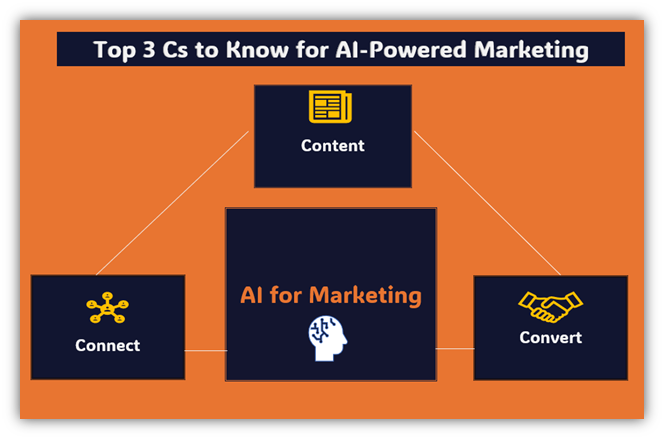The use of AI in marketing can empower a business to leverage data-driven insights, automate processes, personalize user experiences, and optimize strategies to maximize the return on investment. In this blog, we share three common use cases as well as some of the free tools available for optimization.
Uses Of AI in Marketing
Embracing technological advancements and incorporating them into business is essential for revolutionizing and growing your company in a fast-paced environment. Leveraging AI in marketing and sales has become seemingly important to drive positive results and profits. Some of the major areas where AI has a role in marketing are for copywriting, business emails and marketing automation. Let’s break these down in more detail:
AI-powered copywriting
AI-powered copywriting is a rapidly growing field that utilizes natural language processing (NLP) and machine learning algorithms to generate written content. AI copywriting can generate a lot of content quickly and is much cheaper compared to hiring a copywriter. It can create quality content with less stress on deadlines. It can also help to repurpose older content and enable retargeting. Some examples of how AI is being used in copywriting include:
Content generation and copy optimization: AI can be used to write product descriptions, blog posts, email marketing campaigns, and other types of content in a way that is both engaging and optimized for search engines. These language-based models respond to the input text and give output based on the data gathered. Some tools offer free plans to assist you with creating content For example, Copy.ai can be used for writing various types of content for social media, blog headlines, emails, web copy and more. Scalenut is another tool that has a free plan to generate blogs. Smartcopy helps you to transform your ideas into professional copy. Another interesting tool is the Contentbot.ai, a free versatile tool for bloggers, marketers, copywriters, and SEO specialists. Quillbot is another useful AI writer used for paraphrasingyour content, and it also has a grammar checker for proofreading. While there are more tools available for your use, these are some top options to get you started with exploring all that AI can offer.
Social media: AI can be used to generate social media posts, captions and identify and respond to customer inquiries on social media platforms. AI in social media can also help spot abuse and negativity in the comments section of posts as well as in direct messages. Social media marketers can create effective social media campaigns by extracting insights from customer data and leveraging on apt social media platforms resulting in improved ROI
Here are some social media AI tools you can make use of: Lately is an AI social post generator that helps you to repurpose the long form content into Social media posts which can be used to create content for social media posts. Socialbakers is a top tool for your advanced audience insights and influencer market discovery and analytics. Heyday is the AI conversational tool for social media interaction with humans in real-time. Wordstream, Cortex, and Linkfluence can be used to analyze your competitors, monitor and analyze all your social media channels, and more.
Language translation: AI can be used to translate marketing copy in different languages in order to help you reach global audiences. This can reduce your typical translation costs by translating your marketing materials in less time and with less miscommunication. Having your content available in more languages helps expand the reach of your products and services. Some of the most popular free machine translation tools are Google Translate, Bingo Microsoft Translator, DeepL, and Reverso translation, with features like App integration, document translation, translation memory, offline translation on mobile, speech translation, and website translation widget, and more.
Email personalization: Personalized email campaigns can be designed to use AI by analyzing the recipient’s behavior, demographics, and data points. AI-powered email marketing analyzes thousands and thousands of inboxes for marketers which can create better, more personalized content for the subscribers. Here are some of the free email marketing tools: Sender and Moosend provide basic free plans and AI-driven platforms. Sendinblue is known for its AI-driven A/B testing for optimizing your email campaigns. Automizy is yet another free tool known for its email marketing capabilities and analytic features.
AI for Business Emails
AI for Business Emails can make use of artificial intelligence technology to improve the efficiency and effectiveness of business e-mails. Features like Email Automation, Personalization, Language processing, Spam detection, Prediction, Sentiment analysis, and Email Summarization are included in this technology.
Email Automation: AI-powered automation tools can help schedule, send, and track e-mails based on specific triggers, such as a customer’s behavior or a specific date and time. There are several email automation tools that can help you with your email marketing efforts. A few tools that offer free plans are Mailchimp, where you can set up 10,000 emails per month with a maximum of 2000 subscribers. Mailerlite provides automation capabilities for up to 1000 subscribers with email autoresponders, landing pages, and subscriber management tools. Brevo allows you to have unlimited contacts and 9000 emails per month. Benchmark Email includes basic automation features like autoresponders, event-triggered emails, and engagement-based segmentation with 500 subscribers and 500 emails per month. You can get access to even more advanced features with paid plans to meet your specific requirements.
Language Processing: AI-powered natural language processing tools can help to improve the grammar, tone, and style of emails for better communication. AI helps to overcome the challenges of A/B testing by enabling marketers to perform multi-armed bandit testing that allows multitasking, testing everything in your email campaigns like images, content, and even the time taken to send in the emails. Automizy and Optimail are the two tools that are often used to perform these kinds of tests. AI-enabled language processing helps the marketer to plan engaging content with the correct email content, image, and the right combination of subject lines. It also can help to increase revenue by segmenting the email subscribers and targeting them to ensure the success of the campaigns. AI also enables the marketer to determine the email copy that resonates with the brand voice, desired audience, and creates personalized emails catering to their needs and preferences.
Spam Detection: AI can help identify and filter out spam emails. It has techniques that can analyze various characteristics of emails such as content, sender details, and metadata, to determine the likelihood of a message being spam. AI has the capability to extract various features from emails like headers, subject lines, sender addresses, HTML content, attachments, and embedded links. It detects unusual patterns and mismatched senders’ information that indicates spam. AI-powered spam filters maintain a list of spam sources called blacklists and whitelists, and the algorithms can identify and block messages. Another interesting aspect is behavioral analysis where AI algorithms can analyze user behavior such as email interactions and feedback to improve spam detection accuracy.
Prediction and Sentimental Analysis: AI can analyze the behavior of recipients and predict the best time to send an email. It can also analyze the tone of the emails and respond accordingly. This feature helps the marketer tailor their email campaigns for better engagement. Customer lifetime value predictions analyze the customer data to predict the value of customers over their lifetime, allowing marketers to prioritize and allocate the resources to customers with high potential value. AI algorithms can analyze the sentiment expressed through email replies, feedback forms, or social media mentions. This helps the marketer to understand the customer’s emotions towards the brand and products. Some tools that are capable of assessing Sentimental Analysis are Monkeylearn, Lexalytics and Microsoft Azure Cognitive Services.
Email Summarization: AI can summarize long emails and allow the recipient to quickly grasp the content without scrolling through the entire message. Tools like TextRank use an algorithm of PageRank to extract the key sentences from a piece of text and identify important sentences based on their semantic similarity to other sentences in the email. Email client plugins such as BART (Bidirectional and AutoRegressive Transformers) and T5 (Text-To-Text Transfer Transformer) are state of the art technologies that can be fine-tuned for specific summarizations. It is important to understand that the success of email summarization depends on the complexity of the email content and the specific requirements of the users or the organization.
AI Marketing Automation
AI Marketing Automation: AI Technologies and algorithms are also used to automate and streamline various marketing tasks and processes. AI can be integrated with marketing tools to achieve efficiency, personalize customer experiences, and optimize the marketing plan. There are countless ways that AI can enhance a marketing plan, including personalized messaging, customer journey optimization, lead scoring and nurturing, behavioral triggers and automation workflows, social sedia management, and performance tracking and optimization. Here is more info on just a few of these opportunities:
Personalized Messaging: AI can use customer data, user behavior, and preferences to deliver customized marketing messages. Segmenting your audience helps to create dynamic content and target the content that resonates with individual customers, hence increasing engagement and conversion rates. AI-powered chatbots and virtual assistants provide automated and personalized customer support, answer queries, and assist with product recommendations and transactions improving the response time and workload of support teams. Some free instant messaging tools that can be used are Bing Chat, Google Bard, Proprofs, HubSpot, to name a few..
Customer Journey Optimization: This AI-powered marketing tool can map the customer journey and optimize it by analyzing their interactions and multiple touch points.This information can allow for automating marketing actions at different stages of the journey, improving the overall customer experience for the business. Customer journey mapping tools with entry-level access for free include Totango, Lucidspark, ZohoCRM, Outsystems, UXPressia,to name a few.
Lead Scoring and Nurturing: These AI tools can assign scores to leads based on their attributes, engagement, and behavior. This will help the marketer to prioritize and plan their efforts on the most promising leads, developing lead qualifications and conversion rates. AI also has the capability to automate these lead-nurturing campaigns and deliver personalized content and suggestions on how to move the leads through the sales funnel. Strategize your lead and conversion rates using free lead nurturing software such as TigerLRM, GetResponse, BenchmarkONE, and more.
Conclusion

AI-powered technologies are not replacing humans, but are providing us with new tools and methods of doing tasks that can help increase quality and efficiency. AI enables marketers to stay ahead of their audiences needs to deliver best services and value to customers..
AI is already showing up in creative and impactful ways Read our latest blog on the Barbie Marketing strategy to learn how they Barbie team used AI technology to create a selfie generator for fans: ‘Barbie Me Moments’!
AI-enabled filters need regular updates and users need to train them with new data to be effective against emerging spam threats. AI is a transformative technology that evolves and reshapes the business outlook, but AI capabilities need to be combined with human expertise and creativity to achieve outstanding results.


